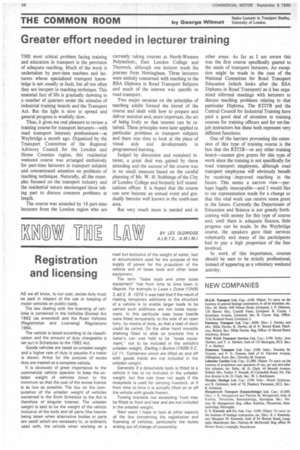!IRIDY1 7NIE RAY
Page 70

If you've noticed an error in this article please click here to report it so we can fix it.
BY LES OLDRIDGE, A.I.Ff.T.E„ A.114,1,44.1.
Registration and licensing
AS we all know, to our cost, excise duty must be paid in respect of the use or keeping of motor vehicles on public roads.
The law dealing with the licensing of vehicles is contained in the Vehicles (Excise) Act 1962 (as amended) and the Road Vehicles (Registration and Licensing) Regulations 1964.
The vehicle is taxed according to its classification and the amount of duty chargeable is set out in Schedules to the 1962 Act.
Goods vehicles are taxed on unladen weight and a higher rate of duty is payable if a trailer is drawn: Artics for the purpose of excise duty are treated as a complete vehicle.
It is obviously of great importance to the commercial vehicle operator to keep the unladen weight of vehicles down to the minimum so that the cost of the excise licence is as low as possible. The law on the computation of the unladen weight of vehicles contained in the Sixth Schedule to the Act is therefore of singular interest. The unladen weight is said to be the weight of the vehicle inclusive of the body and all parts (the heavier being taken when alternative bodies or parts are used) which are necessary to, or ordinarily used with, the vehicle when working on a
road but exclusive of the weight of water, fuel or accumulators used for the purpose of the supply of power for the propulsion of the vehicle and of loose tools and other loose equipment.
The term "loose tools and other loose equipment" has from time to time been in dispute. For example in Lowe v Stone (1948) 2 All E. R. 1076 it was held that if the result of making temporary additions to the structure of avehicle is to enable larger loads to be carried such additions are not loose equipment. In this particular case loose boards were fitted temporarily to the side of an open lorry, by means of slots, so that a load of slack could be carred. On the other hand movable shelving fitted to slide on brackets into a baker's van was held to be "loose equipment," not to be included in the vehicle's unladen weight. Darling v Burton (1928) S.C. (J) 11. Containers which are lifted on and off with goods inside are not included in the unladen weight.
Generally if a detachable body is fitted to a vehicle it has to be included in the unladen weight, but this rule does not apply if the receptacle is used for carrying livestock, or if from time to time it is actually lifted on or off the vehicle with goods therein.
Towing brackets not exceeding 1cwt may be fitted to front and rear and are not included in the unladen weight.
Next week I hope to look at other aspects of the law concerning the registration and licensing of vehicles, particularly the duties arising out of change of ownership.






















































































































